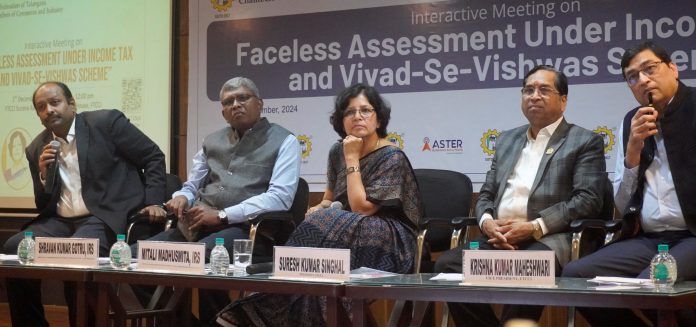Andhra lags behind Telangana in IT collections, says Mitali Madusmita, Principal Chief Commissioner of Income Tax, AP & TS
HYDERABAD, Dec 2 (The CONNECT) –The Income Tax Collection Target for Telangana & Andhra Pradesh for the current financial year is Rs 1,21,000 crore. The IT department has already reached the Rs 59,000 crore mark and is hopeful of achieving the target, said Mitali Madusmita, Principal Chief Commissioner of Income Tax, Andhra Pradesh and Telangana.
The growth of the tax collection compared to last year is 15%. Telangana is showing a good growth rate, however, it is not the same with the Andhra Pradesh state. Telangana last year witnessed 22% growth, the officer added while interacting with the media.
Over Rs 2 lakh crore rupees of tax is pending in both states put together and is under dispute, she shared.
She was addtessing an interactive meeting on “Faceless Assessment under Income Tax and Vivad-Se-Vishwas Scheme” on Monday morning organised by The Federation of Telangana Chamber of Commerce & Industry (FTCCI).
India is the most progressive tax regime in the world, she said. The motto of the Income Tax department under the Ministry of Finance, Government of India about voluntary compliance is to facilitate business and ease of doing business, she added. Our duty is to collect more revenue for the government to spend on public good.
Speaking about Faceless Income Tax Assessment Mitali said the Faceless Assessment is a system where income tax assessments are conducted electronically without any direct interaction between the taxpayer and the assessing officer and it is here to stay. It is irreversible and it is not going to go back. We need to live with it and we need to adapt to it accordingly. Sooner acting is better. It is a greenfield project.
The Scheme which was introduced in 2019 to impart efficiency, transparency and accountability to the assessment process by inter alia eliminating the interface between the Assessing Officer and the assessee is now 5 years and going to go well.
“The assessee’s response to our notices is not very satisfactory,” she said and urged the people to cooperate with the Department.
Unfortunately, the response to Vivad se Vishwas and the Dispute Resolution Committee (DRC) is lukewarm. “We anticipated getting inundated with the cases, but, unfortunately, that has not happened,” she said.
Shravan Kumar Gotru, Principal Commissioner of Income Tax (Review Unit-I) urged people to utilize this opportunity.
The Direct Tax Vivad se Vishwas Rules, 2024, aim to streamline the resolution of direct tax disputes, ensuring an amicable closure of long-pending litigations. These rules, in continuation of the government’s initiative through the Vivad se Vishwas Scheme, provide taxpayers with a straightforward mechanism to settle disputes by paying specified amounts. The DRC is a committee constituted by the Central Government by provisions of sections of the Income-tax Act to resolve tax disputes Under this scheme, taxpayers meeting specific criteria outlined in the relevant section of the Act can electronically submit an application to the designated DRC for the region overseen by the Principal Chief Commissioner of Income-tax with jurisdiction over the taxpayer he added.
The primary objective of rolling out the Faceless Assessment Scheme was to eliminate the direct human interface for the Assessment Process using the latest technologies online, accessing and dealing from anywhere. Similarly, the Direct Tax Vivad se Vishwas Scheme was notified to resolve pending appeals in case of income tax disputes. Although there are many advantages with both schemes, assesses are facing a few challenges. Earlier, when we met madam she had accepted our invitation for gracing a program at FTCCI to interact with
the professionals and representatives of Trade and Industry to listen to the challenges being faced under these schemes.
Sudhir VS, Chairman of the Direct Taxes Committee of FTCCI said in his introductory remarks both taxpayers and tax administrators have some pain points and challenges. We wanted to facilitate a dialogue for better understanding and cooperation so that it would be a win-win for both. Taxes are important sources of revenue for the government. Hence, as responsible citizens, we must ensure that we pay our taxes on time. Taxes allow the government to run and manage the country efficiently. At the same time the tax administration also needs to facilitate comfortable tax compliance, he added.




